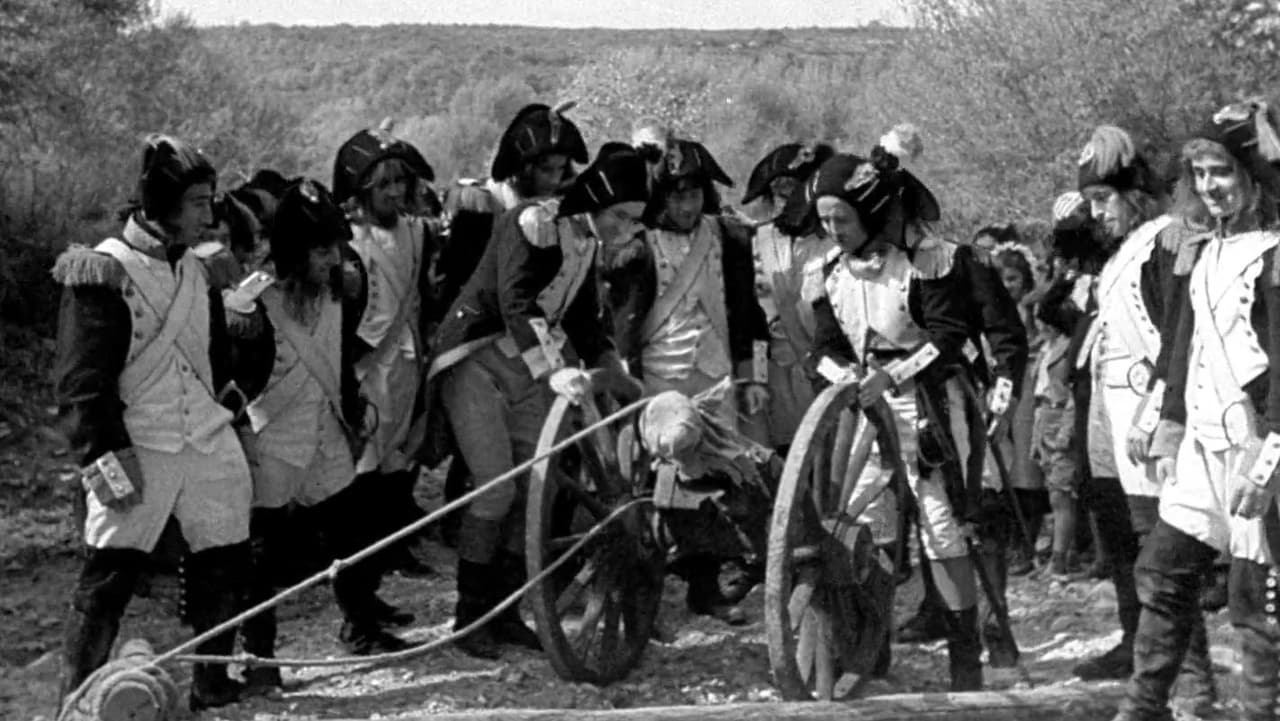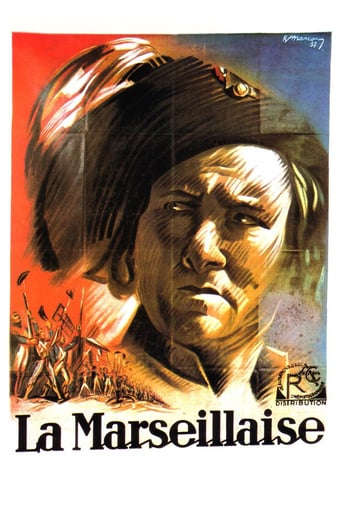



very weak, unfortunately
It's the kind of movie you'll want to see a second time with someone who hasn't seen it yet, to remember what it was like to watch it for the first time.
View MoreThere are moments in this movie where the great movie it could've been peek out... They're fleeting, here, but they're worth savoring, and they happen often enough to make it worth your while.
View MoreIt's a good bad... and worth a popcorn matinée. While it's easy to lament what could have been...
View MoreLa Marseillaise takes place during the phase of the French revolution that was the most optimistic and the least bloody. Director Jean Renoir is concerned with how this moment is viewed by both the monarchy in Paris and the everyday people of Marseillaise who march to Paris singing their song (Battle Hymn of the Rhine Army). His presentation is realistic and probably more accurate than most films that have dealt with the subject.La Marseillaise has been proclaimed as a masterpiece but, while I liked the film, I cannot share in that acclaim. Jean Renoir is considered one of the (if not THE) greatest French directors in film history. I love The Rules of the Game, but have found many of Renoir's other films slow going. This is true of parts of La Marseillaise as well. The running time is 132 minutes; there is (intentionally) no main protagonist; an assumption is made that the audience knows more about the historical events than some viewers (like me) may.Despite some restlessness on my part, La Marseillaise remains a worthwhile film. Every Jean Renoir film has wonderful moments, La Marseillaise especially. My favorite is Louis XVI's long walk with his family to Parilament. Renoir uses a crane shot to view the pedestrians. The dejected look on the King's face is powerful. He and his son share a reflexive moment over fallen leaves. This scene powerfully contrasts with the buffoonish way Louis was portrayed at the beginning of the film. This is a perfectly made scene. The film has other great scenes as well. Although it did not affect me as deeply as it has others, I would recommend La Marseillaise, especially to French film admirers, students of Jean Renoir, and history buffs.
View MoreComing as it does between the much better-known and acclaimed La Grande illusion and La Bête humaine, it's not surprising that this epic story of the French Revolution told mostly from the point of view of several peasant and laboring-class men who find themselves (mostly uneasily) caught up in the events of the early part of the revolt would get glossed over by many film historians. And it's not quite on the level of those masterpieces nor of La Règle du jeu from the following year or for that matter most of Renoir's 40s and 50s output, but it's also hardly worthy of dismissal.The film begins in the countryside and the Mediterranean port city of Marseilles, as a middle-aged man is about to be tried (and presumably executed) for the killing of a pigeon on his lord's land. He instead escapes into the country, into the mountains, where he meets up with with other like-minded impoverished proto-rebels. Slowly over the course of the first half-hour the struggle takes on political tones rather than just the personal gripe of one man, and it is the genius of the film to keep slowly building to the inevitable climax of "The Nation" versus "The King" while never forgetting to regard participants also as individuals.By the middle of the film the royal family and nobles have begun to understand the dangers they face, or at least some have -- the king still ignores the growing strife -- and they begin to play a major role in the film. Interestingly, the prime revolutionaries themselves though mentioned never take the stage; the focus is always on the lowest and the highest members of society, with the intellectuals who fomented the events offstage. Renoir is, it seems, trying to tell us that events were inevitable, and the prime movers really aren't all that significant if we look at the lives of those who stood most to gain, or lose.The final battle sequences are impressively staged, the film as a whole is strikingly well-acted and pretty seamless for all its shifting of focus between the oblivious king and his progressively angrier subjects. Particular acting honors would go to Edmond Ardisson as Bomier, whose growing beginnings of an understanding that revolution is not merely about him, but about the whole world around him are very moving. Pierre Renoir as Louis XVI manages to be foolish, brutal, and sympathetic by turns.
View MoreJean Renoir's classic tribute to the glory of the French Revolution, the film captures the personal flavor of the struggle and the philosophical background to the revolutionary upheaval. In a rapid series of vignettes we are introduced to the elegance and nobility of the court of Louis XVI and Marie-Antoinette... the contrasting plight of French peasants governed by laws they cannot understand...the storming of the Bastille in 1789 by an undisciplined mob...the plotting of France's exiled nobility to return to power...the Republican march on Paris...and the capture of the Tuilleries in 1793, ending the revolution. The film follows the adventures of two young patriots who join the Peoples' army in Marseilles. As their battalion begins its long journey north to Paris to join with the Federate army, they adopt as their anthem a song from the Army of the Rhine. This song was soon to be known all over France as "La Marseillaise" and would lead the newly unified nation to victory.
View MoreThis film, despite being directed by Renoir, is largely forgotten today. This is a pity, as there are few films actually about the French Revolution (though it is used as a backdrop for a variety of plot lines), and none that really deal with the birth of the Republic.It was made at the tail end of the 'Popular Front' government, a coalition of parties (including the communists) formed to protect the Third Republic from right-wing domestic subversion and the baleful influence of the Nazis.It chose to use the early years of the revolution as a metaphor for this political situation - France was still a (constitutional) monarchy, and the King possessed the power of a constitutional veto. The Queen and her circle were said to be plotting a counter revolution.Within this context, each city and region of France is requested to send a Battalion to Paris, to defend the government against its domestic enemies. We follow the adventures of some of the ordinary men in the battalion from Marseilles (who sing a new song called the "Marseilles" as they march. We see their experiences in Paris (including a love interest), and their simple and honest defence of what they believe in. Finally, they participate in the coup that leads to the establishment of the Republic and the arrest of the King.The film is episodic, and some of the scenes are a little melodramatic. But the characterisation is excellent. The King and his court are not one-dimensional villains. The scene of his departure is quite moving.In short, a film well worth rescuing from obscurity.
View More